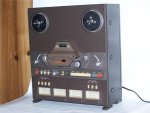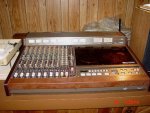bozmillar
New member
I started this thread in a different section, the realized it probably belongs here.
I've read about a million threads on analog vs digital, but they seem to generally be religious arguments rather than factual. I do not want to start another one. What I do want are some cold hard specs on reel to reel sound quality. SNR, Dynamic range, frequency response, THD and the likes.
We all know the how this works in digital audio, but as far as analog tape goes, I've never seen a spec written. Can somebody please provide this?
Also, the same for vinyl.
(I don't want this to turn into an analog vs digital argument. I just want some real information. The words warm, brittle, sterile and so forth are useless terms. Please don't use them.)
I've read about a million threads on analog vs digital, but they seem to generally be religious arguments rather than factual. I do not want to start another one. What I do want are some cold hard specs on reel to reel sound quality. SNR, Dynamic range, frequency response, THD and the likes.
We all know the how this works in digital audio, but as far as analog tape goes, I've never seen a spec written. Can somebody please provide this?
Also, the same for vinyl.
(I don't want this to turn into an analog vs digital argument. I just want some real information. The words warm, brittle, sterile and so forth are useless terms. Please don't use them.)







